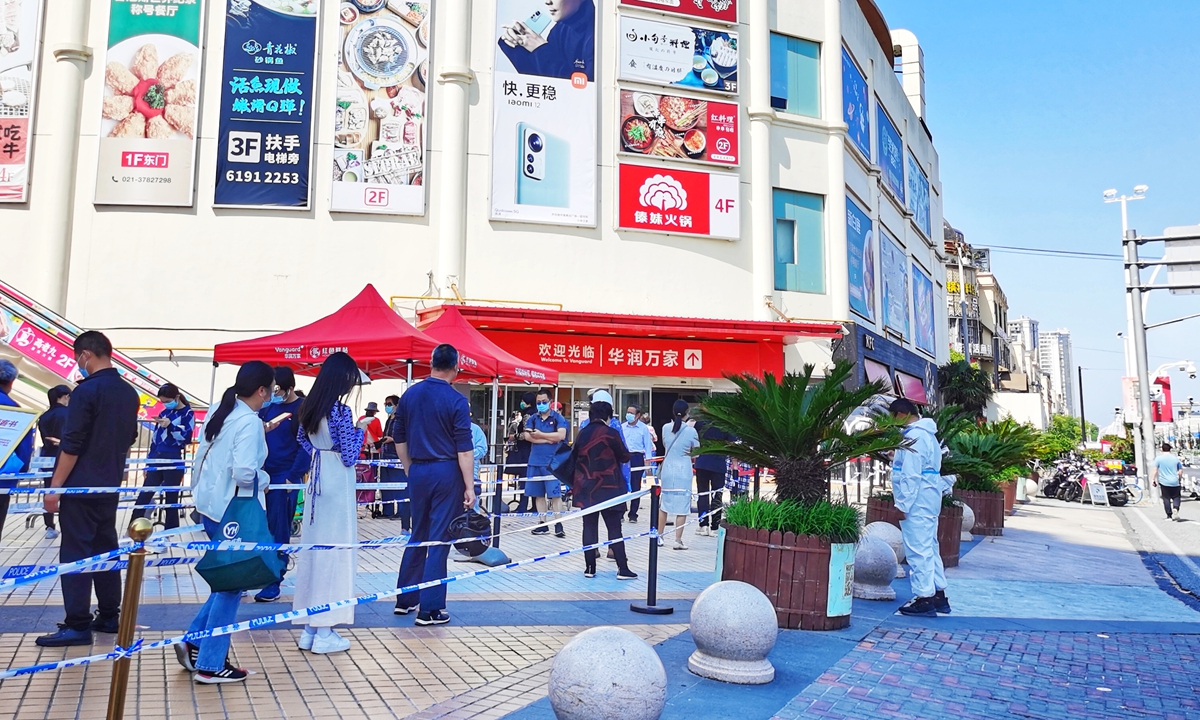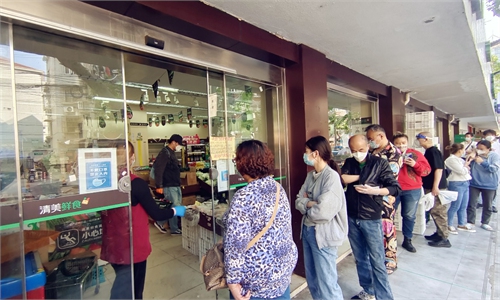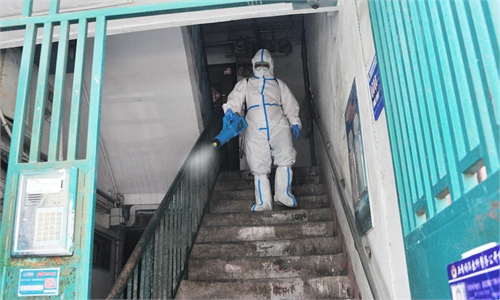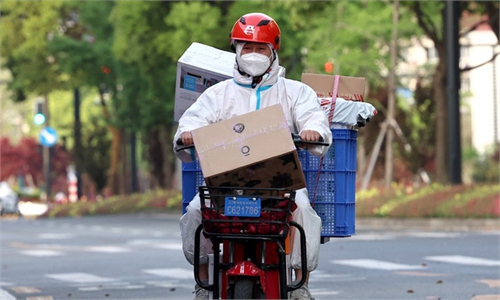Shanghai restarts business and services in phases, with more than 10,000 commercial outlets in operation

Shanghai residents line up to shop at a supermarket amid the resumption of businesses. Photo: VCG
With supermarkets, shopping malls and convenience stores in Shanghai scheduled to reopen from Monday, flights between Shanghai and some other cities to be resumed, and as companies like Tesla and SAIC Volkswagen resume production and even exports of their vehicles, the city with a population of about 25 million is picking up its economic capacity again.
The market resumption, coming after nearly two months of business suspension, shows the government's determination to strike a balance between the epidemic control and the economic recovery.
Shanghai is set to restart business and services activities in phases from Monday, with shopping centers, supermarkets, pharmacies, wet markets, catering and hairdressing services to resume offline operations in an orderly manner, Chen Tong, deputy mayor of Shanghai, announced at a press briefing on Sunday.
The resumption of commerce and business activities will progress in phases on the principle of orderly openness, limited flow, effective control and classified management. Special passages will be designated for the businesses to limit the flow of personnel, while wholesale food markets are also allowed to carry out contactless transactions in order to control the traffic.
According to Chen, the number of commercial outlets in operation in the city has increased to 10,625 now from the lowest number of fewer than 1,400, with the daily number of delivery orders reaching 5 million.
A vendor surnamed Lin selling meat products at a grocery store in Minhang district told the Global Times on Sunday the grocery store has obtained the permit as a supplier of daily necessities and will reopen on Monday.
In order to apply for the permit, the applicant has to provide business licenses, negative results for nucleic acid tests and antigen tests and other application materials. They also need to take nucleic acid tests regularly after business resumption.
"I hope the epidemic can be contained and the lockdown be lifted as soon as possible since my fellow vendors and me have no sound sleep at the shabby store premises at all and we have to eat either instant noodles or foods shared by nearby residents, which is rather tough," Lin said. He has been sleeping at the store for the past two months.
As the city releases the "pausing button" and expands the scope of business resumption, it particularly has an eye on helping companies involving trade businesses to restart operation. Gu Jun, director of Shanghai Municipal Commission of Commerce, said at the press conference that Shanghai has worked out a business resumption guidance for key foreign trade companies and has released two batches of "white lists" for 704 leading foreign trade companies, which cover retail, services, foreign company headquarters and port services.
About 63 percent of the first batch of 142 white list trade companies have resumed operations and the second batch of 562 companies are making preparations for restarting. The third batch of 820 white-listed companies will be released soon, Gu said.
Reopening in phases
"Pausing the "trade button" in Shanghai for too long will not only bring disruption to global supplies, as Shanghai is a leading global logistics center, but also poses the risk of supply chains moving out of China. If that happens, it definitely is much harder to get those industries back even after the coronavirus is under control," Xi Junyang, a professor at the Shanghai University of Finance and Economics, told the Global Times on Sunday.
Companies are actively coordinating with the government's arrangements on work resumption.
South Korean cosmetic giant Amore Pacific, for example, told the Global Times via a written statement that the first batch of employees have gradually returned to the company's factory in Shanghai's Jiading district to resume work.
The company has taken multiple measures to ensure the stability of its business operation, including carrying out closed-loop management of its employees, designating special driving routes and unloading sites for its logistics vehicles, as well as using the firm's warehouses and logistics centers in other cities to relieve logistics pressure.
"The COVID won't sway our confidence in developing in China in the long run," said Mike Hwang, President of Amorepacific China.
Tesla is also reportedly to export the second batch of vehicles amounting to about 4,000 to overseas markets, after it already shipped about 4,700 electric cars following work resumption on May 11, a report of kankanews.com noted on Sunday.
Apart from trade companies, many industries are gradually coming back to normal business after a standstill for some time.
Shanghai-based Spring Airlines and Juneyao Airlines will resume services from Monday amid gradual decline in the number of daily new positive infections in the city.
Juneyao Airlines told the Global Times that it would resume flights between Shanghai Pudong and Fujian's Longyan starting from Monday, the company's first domestic passenger flight starting from Shanghai since the city's closed-loop management.
The manufacturing sector in Shanghai is speeding up the pace of work resumption. In general, nearly 50 percent of Shanghai's 9,000 above-scale industrial companies had resumed work, a local government official said on Friday.
As one of the companies in the first batch of the white-listed companies, SAIC's production line has resumed production and all personnel are under closed-loop management, a staffer surnamed Shi from the company told the Global Times on Sunday.
According to Shi, the company has been under grid management at the critical moment in epidemic prevention and control to secure the safety of the staffers and to step up the recovery and improve capacity of the supply chain. The company shares epidemic prevention and control knowledge via WeChat and provides psychological counseling courses to help the employees relax and build up confidence.
Turning point
The quickened pace to guide Shanghai's business activities back to normal operation is a reflection of the government's eagerness to prevent domestic economic growth from slowing further, as the Chinese financial and logistics hub's economic suspension has dragged down growth in the Yangtze River Delta, and is expected to exert some impact on China's general economic growth as well.
"As Shanghai and the Yangtze River Delta are important production bases in China, economic standstill in those regions will be a big drag on China's industrial and production performance," Cong Yi, a professor at the Tianjin University of Finance and Economics, told the Global Times on Sunday.
This has already shown up in recent economic statistics. For example, many cities in East China's Jiangsu and Zhejiang Provinces saw double-digital year-on-year drops in government revenue in April, including Suzhou, Hangzhou and Ningbo.
China's export growth in April, which stood at 3.9 percent, was also lower than market expectations.
Therefore, the resumption of economic activities in Shanghai could bring about a turning point in the recent economic downward trend, as China's economy is expected to rebound in late-May or June, experts said.
"Shanghai's work resumption is a signal that the government is taking steps to offset the impact of the COVID-19 situation on the second quarter economy," Cong said, forecasting that second-quarter GDP growth should be around 4 percent, compared with 4.8 percent in the first quarter.
CITIC Futures predicted in a report released on April 30 that the second quarter GDP would increase 4.2 percent year-on-year.
According to him, once the pandemic is put under complete control, China will provide a strong package of stimulus policies to lift the economy in the second half of this year.
Xi Junyang agreed that the negative influence of COVID-19 outbreaks will peak in the second quarter, with GDP growth from April to June slipping to around 3 percent and consumer inflation index surging to around 2.5. But with economic resumption in place, the economy will start to recover from June.
"A full recovery will take another two or three months, as the city will still be strict about pandemic control and prevention, and it's hard for economy to jump back to pre-pandemic levels. But a rebound is for certain," Xi said.
Economists proposed a number of suggestions at the 2022 Tsinghua PBCSF Chief Economists Forum held in Beijing on Saturday. Yu Yongding, a scholar of the Chinese Academy of Social Sciences, said that China should consider expansionary fiscal and monetary policies to stimulate domestic demand and spur imports, as well as increase imports of commodities and strategic goods.
Guan Tao, global chief economist at BOC International, also said that with China's large economic size, ample policy space and leeway, China should have the confidence, capability and conditions to cope with the current challenges.
"The key is to do China's own business, stabilize macro economy and keep China's leading role in pandemic prevention/control and economic recovery," Guan said.




